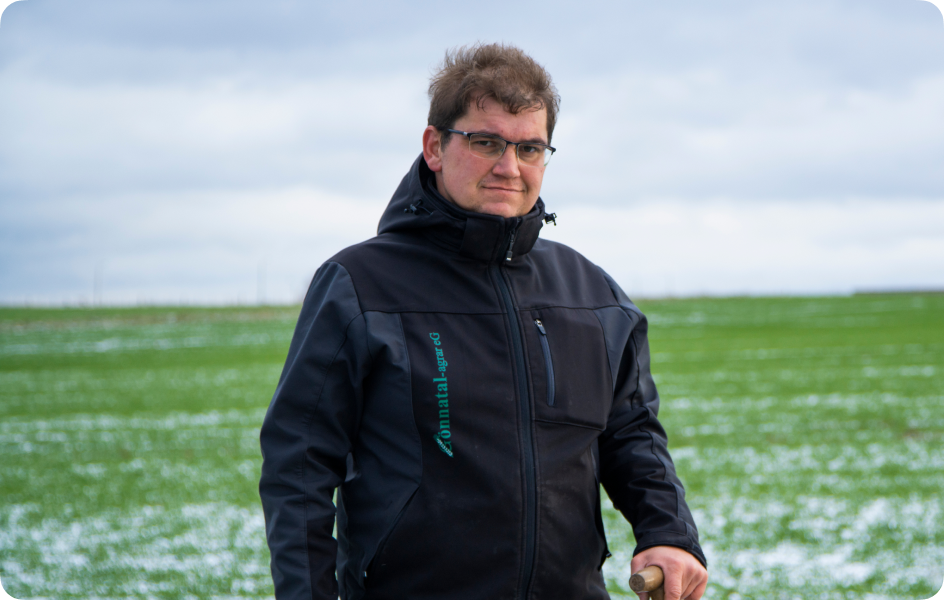

Resilient
wheat supply chains
Get personalised advice and discover how your company can also benefit from Klim’s services.
Read the success story
Summary
Since 2023, ARYZTA has teamed up with Klim to decarbonize its wheat supply chain. By promoting regenerative farming practices, and working with three milling partners and over 20 farms, the journey toward a more sustainable supply chain is becoming a reality.
fritz-kola is actively committed to sustainability. In collaboration with Klim, a joint project was launched in 2024 to promote regenerative practices in sugar beet cultivation within the supply chain. Six farmers from North Rhine-Westphalia, Thuringia, Saxony-Anhalt, and Saxony adopted these practices, producing 2,000 tons of sugar used in the production of fritz-kola’s soft drinks. This initiative also led to a reduction of 1,800 tons of CO₂ emissions.
fritz-kola is actively committed to sustainability. In collaboration with Klim, a joint project was launched in 2024 to promote regenerative practices in sugar beet cultivation within the supply chain. Six farmers from North Rhine-Westphalia, Thuringia, Saxony-Anhalt, and Saxony adopted these practices, producing 2,000 tons of sugar used in the production of fritz-kola’s soft drinks. This initiative also led to a reduction of 1,800 tons of CO₂ emissions.
Motivation
What drives ARYZTA
ARYZTA is committed to a sustainable food chain. Yet sourcing challenges are increasing, with quality wheat becoming scarcer and climate change adding new pressures. Together with Klim, ARYZTA is taking a practical approach to decarbonizing its supply chain and building resilience for the future.
ARYZTA's motivation for regenerative practices:
Ready to strengthen regenerative practices in your company and implement tailored Scope-3 solutions?
Contact an expert
.png)
Case study
How ARYZTA and Klim work together
Timeline
Together with ARYZTA, Klim analyzed its supply chain, identified key sourcing regions, and developed a project plan with three selected milling partners.
Today, 21 farms in northern and eastern Germany are implementing regenerative practices on more than 8,000 hectares, including cover cropping, crop rotation, reduced tillage, and more.
Today, 21 farms in northern and eastern Germany are implementing regenerative practices on more than 8,000 hectares, including cover cropping, crop rotation, reduced tillage, and more.
Project definition:
Klim and ARYZTA set clear goals for CO₂ reduction and soil health and defined the relevant raw materials and regions.
Involvement of farmers:
21 selected wheat farmers from various regions of Germany were onboarded to the project.
Support and advice:
Klim experts supported the agricultural businesses with training and individual consulting for implementing regenerative measures.
Result analysis:
The impacts of the measures were documented on the Klim Platform, including the saving of 15,000 tons of CO₂ since 2023.
Farm Visit:
The effects of the measures were documented on the Klim Platform, including a savings of 1,800 tons of CO₂.
Communication and visibility:
The project results were shared through active media coverage, social media posts, and photos.
Agricultural perspective
A participating Klim farmer

Tristan Sammer, farmer from Thuringia:
Since joining the project with ARYZTA and Klim, we have expanded our crop rotation and increased cover cropping from 50 to 200 hectares. This not only reduces CO₂ emissions but also improves soil structure and water retention, which is a huge benefit for us, especially in dry years.
Since joining the project with ARYZTA and Klim, we have expanded our crop rotation and increased cover cropping from 50 to 200 hectares. This not only reduces CO₂ emissions but also improves soil structure and water retention, which is a huge benefit for us, especially in dry years.
Results on his farm:
Success factors
Additional outcomes of the Klim-ARYZTA collaboration
Strong partnerships
With wheat quality declining and climate risks rising, ARYZTA works with Klim to build long-term, fair relationships with farmers, creating resilient, regionally anchored supply chains.
Close exchange with farmers
Klim supports farmers through training and regular consulting, helping them implement regenerative practices. Direct collaboration ensures both stable yields and ecological improvements.
Talk to an expert
Projects with Klim
Klim's Scope 3 projects
offer numerous advantages

For companies
Reduce emissions through CO₂ reductions and avoidance
Support sustainable food security and promote biodiversity
Strengthen partnerships across the entire value chain
Access validated metrics aligned with GHGP LSRG and SBTi FLAG standards
Achieve Scope-3 reductions even with limited traceability, thanks to the supply-shed approach

For farmers:
Improve soil health and secure yields
Reduced operating costs through lower use of fertilisers, diesel, and pesticides
Greater resilience against extreme weather
Promote biodiversity on agricultural land
Gain access to expertise and a network of practitioners
How it works
Implementation of regenerative practices
Identify
We identify the biggest levers for regenerative approaches along your value chain.
Plan
Together with you, we design scalable projects that are precisely aligned with your business goals.
Implement
Farmers receive targeted support – through financial assistance, our digital platform, and professional guidance from the Klim team.
Report
Use validated, scientifically based data to transparently present your Scope-3 emissions.
Benefit
Get closer to your sustainability goals while benefiting from stable yields, more robust supply chains, and stronger partnerships.
Step 1
Plan
Development of management plans with Klim's team of experts.
Step 2
Onboard
Individual consultancy and onboarding to Klim's digital platform.
Step 3
Implement
Integration of emission-reducing measures.
Step 4
Analysis & verification
Klim analyses and reviews data on emissions reduction and storage.
Step 6
Expansion
Continuous expansion of the project scope and support from Klim agricultural experts.
Ready to take the next step?
We offer a free consultation to identify the potential of Regenerative Agriculture for your company.

Samuel Fisser
Insetting Lead
Ready to create your own success story?
We offer a free consultation to assess the potential of regenerative agriculture for your business.
Get in touch





%201.png)